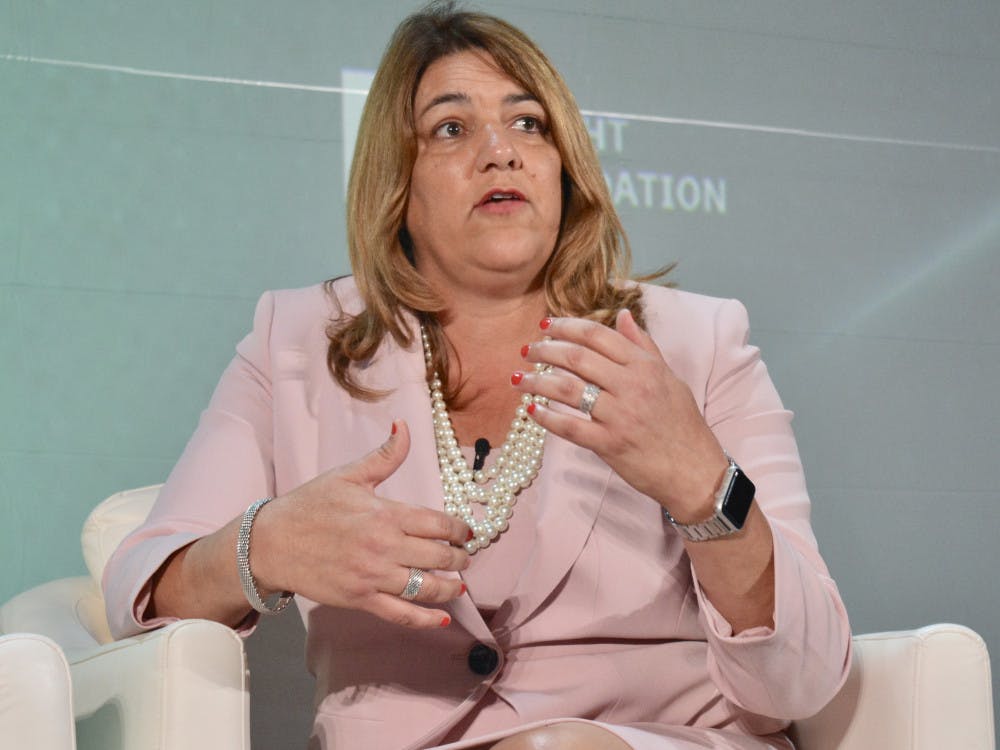Florida public schools are feeling the squeeze and asking taxpayers to fork out more cash to improve education.
The most important resource to improve education is more money, said Florida influencer Cindy Arenberg Seltzer at the Florida Priorities Summit in Miami on Wednesday. Arenberg Seltzer and a group of other influencers came up with suggestions on how to solve problems in Florida’s education system during a workshop session Tuesday.
Fixing the public education system starts by making sure the state government funds it adequately and adds money from the lottery and other local sources as extra income, Arenberg Seltzer said.
In Alachua County Public Schools, officials want to find more money to increase pay for teachers, fix outdated facilities, provide additional school security and enhance mental health resources.
The county’s school system took the problem of its outdated facilities into its own hands and passed a half-cent sales tax initiative in the 2018 midterm elections.
Revenue from the tax could bring in an extra $264 million over 12 years to invest in upgrades to school facilities, which are gearing up to start soon, said Alachua County Public Schools spokesperson Jackie Johnson. These include new classrooms and science labs, installing new furniture, lighting and flooring and overhauling school security.
Lawmakers in Tallahassee cut facilities funding to local schools by more than $168 million in the last 10 years.
More than 30 other counties in Florida have resorted to passing a sales tax to upgrade facilities, Johnson said.
But facilities are just a start. Johnson said the state isn’t providing enough funding for things lawmakers implemented like recent school safety laws.
“I think people need to elect people who are willing to invest in public education because we don’t have that right now,” Johnson said.
Alachua County schools also face the problem of a wide achievement gap between black and white students divided between the east and west — with mostly black eastside elementary school students failing statewide exams and mostly white students passing exams in westside schools.
Alachua County Public Schools has the largest achievement gap of the 67 counties in Florida.
The district revealed a plan in August to close the gap by tackling student achievement, advanced coursework, graduation rates, student discipline and diversity of the workforce.
With three boys going to public schools in East Gainesville, Nicole Stewart, 47, said she feels the pinch in the equity gap. At Abraham Lincoln Middle School, where her son used to attend, the school offers different hallways, newer computers and textbooks to its Lyceum magnet program, Stewart said.
The same resources are not given to students not in the program, said Stewart, a retired 15-year Miami-Dade County Public Schools teacher.
“There’s a very glaring difference, and people pretend not to see it,” she said. “How could they educate kids in one hallway different than another? There should be equality in the way we educate students.”
Madeline Pumariega, a Florida Priorities Summit speaker and chancellor of the Florida College System, said more can be done to close the gap, especially with a top eight public university and a local college in the neighborhood of Alachua students.
Institutions could expand funding of dual enrollment courses to help future students save money and finish college faster to enter the workforce, Pumariega said. University officials can also have talks with superintendents to work together to offer programs and services and educate students on college scholarships and Pell Grants.
“I think there’s a focus in making sure that all students succeed and that every student achieves,” she said.
Contact Christina Morales at cmorales@alligator.org and follow her on Twitter at @Christina_M18
Madeline Pumariega, chancellor of the Florida College System, makes a point at the Florida Priorities Summit.






